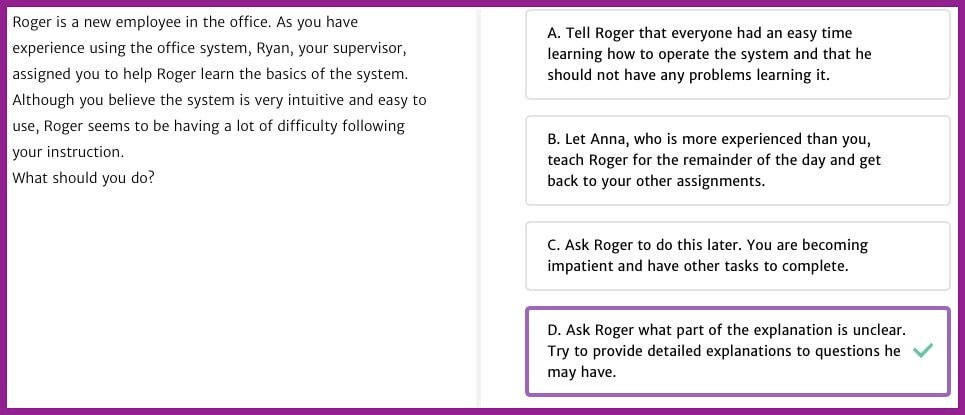What is the New Online Assessment Centre for Police Recruitment?
"You cannot discover new oceans without the courage to lose sight of the shore."
- Andre Gide
I highlighted in early April this COVID19 crisis would spark a revolution in police recruitment processes to continue Uplift, with 'Virtual Assessment Centres' in England & Wales forces coming to replace 'SEARCH' and 'DAY ONE'. This has now quickly become reality, with the College of Policing (COP) recently announcing the new online assessment process as part of measures to support police recruitment. But what is this new virtual assessment centre for recruiting officers?
As an overview, the police online assessment centre will last throughout 2020 and entail the following three elements, each of which this blog provides guidance on, absolutely free:
Step 1: Situational Judgement Test (SJT) Step 2: Competency-Based Video Interview Step 3: Briefing Exercise & Written Exercise What's New In These Police Assessment Centres?
It has been made clear this new police assessment centre process will replace SEARCH and DAY ONE assessment centres for all of 2020. So what's new?
For a start, the College has significantly streamlined the volume of assessment done. They have dispensed with verbal reasoning tests, numerical reasoning tests and role play scenarios entirely. Second, the focus will be 'competency-based' throughout. This means you will be assessed against Level 1 competencies and values described in the CVF. For example, here are the Level 1 criteria for the competency 'We are emotionally aware' in detail. I suggest you familiarise yourself with the others too! I'll do some blogs around the CVF officer competencies in due course, however for now you might like to read my blog on emotional intelligence. This is set in the context of police promotion (Level 2), but you'll see later how those who EXCEED the Level 1 competencies score higher marks!
Once applied to your chosen force, you will receive an email inviting you with a link to the College online assessment platform, called 'LaunchPad'. You will be able to access this anytime and anywhere with an internet connection - ensure yours is working well! You don't require specific policing knowledge or experience to excel, but comprehensive support is available from us at Police Success should you want it!
There will be some information about the role of a police officer, also covered extensively in the Police Success guide. Now you have a bit of an introduction, here are those three steps of the virtual assessment centre in more detail... 1. Situational Judgement Test
" A lot of people never use their initiative because no-one told them to."
- Banksy
What is a Situational Judgement Test (SJT) used in police applications? In summary, a SJT is an assessment of your ability to make decisions in situations similar to that you will face as a police officer.
You will be presented on screen with a number of written scenarios in turn. For each one, your task is to choose what you think is the BEST response to the situation, presented from four available options. These options are generally designed to be scored on a scale which you can imagine ranges from 'Terrible idea!' to 'Most effective'. Allow yourself 2-3 minutes for each scenario, to ensure you are reading the question and options carefully, but being swift to complete the full test within the time limit set. You must do this in one sitting, so check your internet connection and get yourself settled before you begin. Below is an example of a SJT scenario and four response options, with the 'Most effective' one chosen. The questions you will see on the new virtual assessment centre in LaunchPad will be set in a policing context, for example community problem-solving, de-escalating situations, working with other officers, policing events, interacting with the public as a police officer, and so on. Regardless, it is worth practicing in advance if you have time to familiarise yourself and become an expert. You can access more free practice SJT questions here, or practice police-specific SJTs here if you prefer. Either will prepare you well for this stage of the assessment. 
It (almost!) goes without saying: Don't be sharing screenshots or other information about the LaunchPad assessments, or any other part of the exclusive assessment content for that matter. Like bad language or inappropriate behaviour, this will result in an instant fail for candidates; it's incongruent with the values of honesty and integrity sought in policing.
Made the cut? Then you will be invited to complete step 2 of the police online assessment process... 2. Competency-Based Video Interview
"Creativity is thinking about new things. Innovation is doing new things."
- Theodore Levitt
This step entails recording yourself giving 5-minute recorded responses to a series of competency-based questions asked. Each question will be assessing one of the CVF competencies or values. The candidate guidance document you'll get from the College will tell you exactly which ones they are; read it carefully to focus your preparation and work smart! As a reminder, the six competencies and four values are...
You will receive clear instructions on the technicalities of recording and uploading your responses within the LaunchPad system. There is no human interaction, you receive the questions and prompts on-screen. That might feel a little unusual at first, but from what I hear it's pretty straightforward. Again, worth just checking everything is working on your end and making sure you won't be disturbed, as you only get one take!
It will take a few days for the assessors to watch and assess your responses. They will be scoring each video you upload using a typical 1-5 'Likert' scale. You can assume it looks something like this...
Always aim for 'BEST'! Go look again at those CVF competencies: How will you exceed the required standards? I go into much more detail on interviews in my guide, but will also provide occasional musings on this blog over coming months. If successful, you will then be invited to conduct step 3, which we cover next...
"Give an example of a time or situation when you took the initiative to solve a problem which was outside your comfort zone?"
- Potential interview question 3. Briefing Exercise & Written Exercise
"The will to succeed means nothing without the will to prepare."
- Juma Ikangaa
Step 3 of the College online police assessment process is again assessed against competencies in the CVF and can be broken down into two parts:
But what are briefing exercises and what is a written exercise?
Briefing Exercises are essentially a presentation. That's great news, since I have previously blogged extensively to give detailed guidance on giving effective presentations. The 'Rule of Threes' is a great place to start, very relevant to this process and something to peruse for clarity on your preparation and help give your presentation some impact. It might be worth also browsing some of the College's 'Authorised Professional Practice' used within policing to help spark further ideas. For example, SAFCOM and IIMARCH provide a readymade structured mnemonic of issues to consider addressing in your briefing. Another structure I advocate in any responses to questions is 'PAR': What problems will you address, with what actions, and what will be the result achieved by doing so?
You can expect to be given a description of a policing or community problem to solve. You will then have time to prepare with materials given to you before providing answers to questions raised in a briefing style. I will blog in some detail on this element in due course to help police officer recruitment candidates prepare effectively. As with all aspects of the online assessment centre, be sure to read the detailed candidate instructions carefully beforehand. This will give you more exact mechanics of the process, like timings and sequencing, so that nothing comes as a surprise to you on the day.
Written exercises are designed to assess a candidate's written communication, comprehension skills and attention to detail. Use your time wisely to read through instructions, the documentation you are provided, crafting your response and then checking it over for clarity or errors before clicking 'submit'.
Again this task will be set in a policing context. A frequent task used in police assessment centres is writing a response to a letter of complaint received from the public, something neighbourhood officers often do. Or it might be from a response / patrol perspective, by compiling a factual incident report based on a gaggle of unstructured information and documentation. I cover this in some more detail in my extensive guide. For now, you can prepare by familiarising yourself with the CVF you get assessed against and as with SJTs, practice written tests beforehand to get match-fit. A common written exercise used across many industries is writing a letter to someone who has complained about receiving a poor service. What Does The Future Hold for Online Police Assessments?
" Prediction is very difficult, particularly when it involves the future."
- Mark Twain
The College will clearly be reviewing the national implementation of this online assessment centre during the Summer months. They are pretty open about plans to reintroduce the human touch and a human interaction once this COVID19-induced emergency planning has passed; not least to help ensure integrity of the process and the ability for assessors to probe candidates further. Don't be surprised if scheduled interviews make a comeback, with real people interviewing, albeit run by normal video-conferencing. There might also be reintroduction of some sort of interactive role play and other assessment tests (e.g. numerical / verbal reasoning), if forces become worried about the process being made too easy to pass.
This online approach also saves the College and forces a great deal of costs, while bringing policing up to date with technology in a major way. It has already been announced this is the standard throughout 2020, no more SEARCH or Day One assessment centres this year. However, it will likely continue in some adjusted form well beyond that... a 'new normal' to use a COVID-19 buzzword goes! Remember, the journey doesn't end with Virtual Assessment Centres on the College of Policing's 'LaunchPad' platform. Forces remain entitled to throw in additional interviews or other steps to the process around this, and are doing so. Don't be alarmed when that is the case for your force! In the meantime opportunity is knocking... good luck! Download the comprehensive Police Success guide for more detailed guidance or feel free to arrange some 1-2-1 coaching for bespoke support. This includes information about the role, CVF, assessment tests, interviews, practice questions, and much more to help you excel and achieve your ambition to join policing in 2020!
Kind Regards,
Steve
0,Police Success
1 Comment
Sophie Odenwalder
1/9/2020 10:27:47 am
Hi
Reply
Your comment will be posted after it is approved.
Leave a Reply. |
 RSS Feed RSS Feed
AuthorA former Royal Marine, Detective Inspector, and is a qualified coach/mentor. With extensive police experience, Steve also established Rank Success to help officers achieve police promotion. CategoriesAll ArchivesFebruary 2021 |









